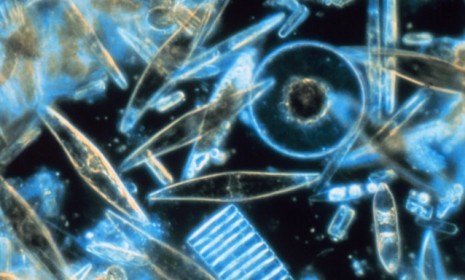Is ocean life being wiped out?
Plant plankton, the microscopic vegetation that marine life depends upon, is dying out at an alarming rate. That spells bad news for all life, say scientists, ocean-dwelling or otherwise

A free daily email with the biggest news stories of the day – and the best features from TheWeek.com
You are now subscribed
Your newsletter sign-up was successful
They may sit at the bottom of the undersea food chain, but plant plankton, or phytoplankton, perform a vital service to life on Earth. The microscopic algae provide energy for underwater life, absorb carbon dioxide, and produce half the world's oxygen. But they are disappearing from our oceans at an alarming rate. A brief guide to the worrying decline in plant plankton levels:
What exactly are phytoplankton?
Phytoplankton are tiny plants that provide the foundation for the entire marine ecosystem. They supply nutrients and energy to zooplankton, the smallest creatures in the ocean. Zooplankton, in turn, feed fish and other marine life. Phytoplankton also absorb carbon dioxide and produce oxygen. Scientists say that much of the oxygen in our atmosphere was produced by plant plankton, though photosynthesis, over the past 2 billion years.
The Week
Escape your echo chamber. Get the facts behind the news, plus analysis from multiple perspectives.

Sign up for The Week's Free Newsletters
From our morning news briefing to a weekly Good News Newsletter, get the best of The Week delivered directly to your inbox.
From our morning news briefing to a weekly Good News Newsletter, get the best of The Week delivered directly to your inbox.
How rapidly are they disappearing?
Very rapidly indeed. A new study in the journal Nature has found that worldwide phytoplankton levels have been declining steadily since 1899. They are down 40 percent since 1950, and drop by about 1 percent every year. "Phytoplankton is the basic currency for everything going on in the ocean," said Boris Worm, one of the study's authors. "It's almost like a recession... that has been going on for decades."
Why are they in such rapid decline?
The primary suspect is global warming, according to the report. The ocean temperature has risen by between 0.5 and 1 degree Celsius in the past century. As surface water gets warmer, it doesn't mix as well with colder, deeper water that is rich in nutrients the phytoplankton need. But the report adds that phytoplankton have also disappeared from cold regions, such as the Arctic Ocean, where phytoplankton growth is mainly limited by sunlight — meaning that "changes in wind and ocean circulation" might also be to blame.
A free daily email with the biggest news stories of the day – and the best features from TheWeek.com
Why does all this matter?
It's bad news for all creatures that rely on the oceans for food — from fish to whales to seabirds. Our fish stocks, which are already affected by overfishing and climate change, will diminish further if the decline continues. And there will be fewer plants to absorb the harmful CO2 in our atmosphere.
What happens if the phytoplankton die out?
We'll have dead seas, and a rapid build-up of CO2 in our atmosphere which would theoretically speed up the effects of global warming. But the report's authors say there is no evidence to suggest the decline is terminal.
What do the pundits say?
It's yet another argument in favor of controlling our carbon emissions, says Michael Graham Richard at Treehugger. "When you don't understand how your life-support system works, you should be more careful when tinkering with it." Let's not "succumb to outright panic quite yet," says Megan McArdle in The Atlantic. Nature has a way of offsetting big changes — won't all the extra carbon "make terrestrial plants grow more lushly"? Besides, this is just "one paper" — phytoplankton might not be in the dire shape these researchers think. "When you add this to the decline in butterflies, bees and beetles, says Michael Marshall at the New Scientist, it's a "remarkably bad piece of news." These tiny creatures do the "lion's share" of sustaining life on Earth and they're dying out. "Never mind the pandas. It's plankton, bugs, and fungi you should be worrying about."
Sources: Nature, Yahoo! News, The Scientist, New Scientist, San Francisco Chronicle, The Atlantic